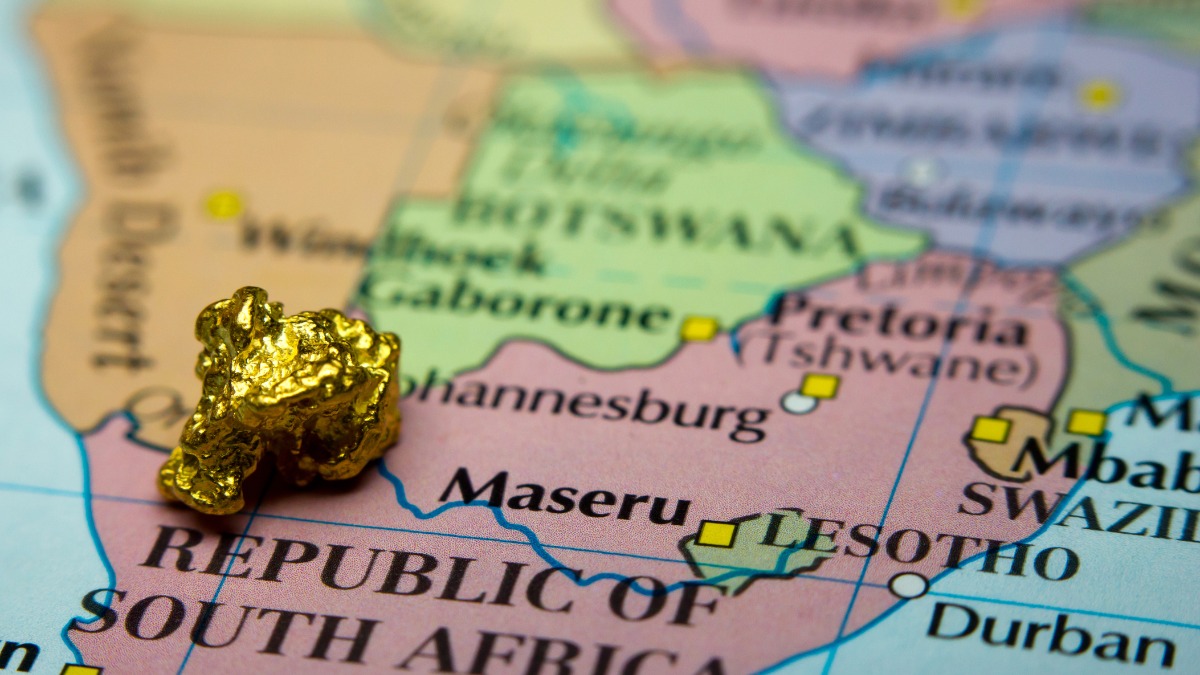ASX directors hopeful of brighter future and investor interest after South Africa’s game-changing election result

Pic: Getty Images
- Miners are hopeful South Africa’s new pro-business coalition will help revive the glory days for the country’s mining industry
- Exploration has collapsed from 5% of the world total to under 1% since the early 2000s
- ASX-listed juniors and gold majors hopeful the country of Nelson Mandela can finally recover from years of underinvestment and corruption in public infrastructure
One of the world’s largest gold miners is holding out hope for a brighter future in South Africa, with a new centre-left coalition aiming to recover what has been called a ‘lost decade’ for the one-time superpower of the mining world.
In May’s general election the African National Congress fell below 50% of the national vote for the first time since the party of Nelson Mandela came to power at the end of Apartheid rule.
While there had been fears President and ANC leader Cyril Ramaphosa would have to deal with the radical left opposition of disgraced former President Jacob Zuma’s uMkhonto we Sizwe, or Julius Mulema’s Economic Freedom Fighters, both of whom have the nationalisation of mines as a policy platform, the business sector has welcomed a coalition of 11 parties called the Government of National Unity.
Importantly, the key partner of the ANC is the pro-free market Democratic Alliance, which secured 22% of the vote against the ANC’s 40% but has been criticised for its perceived ‘whiteness’, having last year opposed quotas for black employment in local enterprises.
Despite criticisms of racial and economic inequality in the region, the DA has been praised by the business community for its management of the Western Cape and its largest city Cape Town, the only province not run by the ANC.
The new CEO of Johannesburg-headquartered Gold Fields, which produces 2.3Moz of gold across Africa, Australia, South America and soon Canada with the C$2.2bn takeover of Windfall gold mine owner Osisko Mining, told media at the recent Diggers and Dealers Mining Forum in Kalgoorlie-Boulder the election result was a ‘maturing’ of the country ~30 years after the collapse of white minority rule.
“I think it would have been very difficult to comprehend this 20 or 30 years ago where you’d have people who come from completely different ideologies starting to work together,” Michael Fraser said.
“But it is really pleasing to see that we’ve found a kind of middle ground, which is what is required for nation building in South Africa for the country to move forward.
“If you look at where South Africa is at the moment, we are a country that has been very hurt by lack of growth, increasing unemployment, increasing inequality, poverty, a poor education system, so there has to be a point in which this kind of revolutionary ideology is going to translate into nation building and I’m hoping this is the rubicon that they’ve now crossed.”
Fraser says the best thing for South African miners is the removal of uncertainty around mining policy.
“As it relates to mining, we’ve been through a lot of painful periods over the past decade or two, trying to find a middle ground on how industry, government and labour find that intersect of doing what’s right for everybody in that sector and I think we found the sweet spot through a lot of hard work and a lot of debates.
“The whole idea of policy uncertainty, I think, has been removed. But it’s really now for us to take advantage and move forward with high degrees of performance.”
Rising fortunes
Concerns over policy settings and the impact of corruption and crime on the logistics and energy networks in South Africa have seen investors lose enthusiasm for stocks there in recent years despite pouring money into other African countries where security and sovereign risk are more fraught.
That was highlighted by BHP’s decision to bid for South African/British mining giant Anglo American earlier this year with the caveat that its three African business units – Kumba Iron Ore, Anglo American Platinum and the De Beers diamond company – either be spun out or reviewed.
The deal eventually fell over as Anglo and BHP couldn’t meet on value, but in a strategic review announced to stave off the BHP takeover, Anglo will look to demerge AmPlats and De Beers itself. Anglo’s top shareholder is the South African public pension fund.
But Gold Fields, which owns the enormous South Deep gold mine in the Witwatersrand Basin, is now up 8.5% YTD, albeit behind the lift in gold prices, which hit a record US$2500/oz yesterday.
Fraser is not bullish on adding to its production profile in South Africa as it weighs up opportunities elsewhere in North and South America, Ghana and Australia.
“Tragically, the mining industry, particularly the gold mining industry, whilst there are opportunities, they are probably not as extensive as elsewhere,” he said.
“A lot of the gold’s been mined and stuff that we are accessing is at quite significant depths. I believe that South Deep is is the best ore body there is to have in South Africa so I wouldn’t necessarily see us growing just purely because there isn’t much of high quality available.”
Once the world’s top gold producer, South African delivered over 600t of output in 1993 (around double that of current world leaders Australia, Russia and China), but has since seen output drop to around 100t.
It remains the world’s largest platinum and second largest palladium producer, and hosts significant coal, mineral sands and copper resources.
But the political and economic environment led to a significant discount for explorers looking to tap its mineral wealth.
That could be changing, with a number ASX-listed South African explorers seeing increased interest following the election result.
Junior goldies West Wits Mining (ASX:WWI) and Theta Gold Mines (ASX:TGM) are both up significantly this year, with manganese producer Jupiter Mines (ASX:JMS) a strong performer after the cyclone-related suspension of South32 (ASX:S32) and Anglo’s GEMCO manganese project in Australia.
Others have largely traded stably in a general resources market that has seen small caps hit for six amid commodity price volatility and global economic softness.
David Casey, the managing director of 2024 helium and natural gas exploration IPO D3 Energy (ASX:D3E), said the election result had improved perceptions from international investors.
“Our shareholder base probably saw that things could get done, but I totally acknowledge that even our shareholder base were keen to see what the results of the election were, whether it would change that dynamic for better or worse,” he told Stockhead.
“Based on what we’ve seen to date, it’s definitely been for the better.
“The previous government, we’d had no issues, at least at the level that we were dealing at prior to that. But I think the perception is definitely important, that you’ve got a genuine democracy working and the system working.”
Tortured legacy
Roger Baxter, the CEO of South Africa’s Minerals Council for almost nine years until 2023, says the decline in the country’s mining industry set in during the reign of the country’s fourth democratically elected president Jacob Zuma.
Following Thabo Mbeki and caretaker Kgalema Motlanthe, Zuma’s management of the economy and South Africa’s public architecture was mired in corruption and allegations of state capture.
Baxter calls the period of Zuma’s rule from 2009 to 2018 a lost decade.
While Australia was reinvented by the world’s largest mining boom on the back of Chinese industrialisation, South Africa’s state owned enterprises were stripped bare by corrupt officials, turning Africa’s largest and most prosperous economy into a basket case as inflation saw its once powerful Rand currency devalued against the US, Euro and Aussie dollar.
Baxter put the loss related to issues with the rail network, where performance declined 40% during the Zuma reign, at US$10bn in 2022. From 5% of the world’s exploration total in the early 2000s, South Africa now enjoys under 1% of that investment. Baxter says the new Government of National Unity wants to reverse that trend and return to its historic 1/20th share of global exploration investment.
“That’s obviously a significant ask and the issues that are going to get us back to that level is obviously fast processing of permits, a clear, transparent cadastral system, and obviously sorting out the logistics and energy-related issues, and then working on a couple of other points which are important from a South African perspective, which includes the ongoing effort to improve the security environment,” he said.
Now the chairman of ASX-listed Southern Palladium (ASX:SPD), which has put a roughly US$400 million price tag on the development of the Bengwenyama platinum, palladium and rhodium project, Baxter sees the introduction of a modern cadastral system as a key to unlocking the country’s mineral wealth.
The nation is covered in mining tenements, but there remains no digital system for miners and explorers to manage their leases, a staple of any modern mining registry and something already available in less mature jurisdictions like Botswana and Namibia.
At one point as many as 2500 licence applications remained unprocessed, though the bulk are in the coal-rich Mpumalanga province where claims have been made in many instances over land already held by other parties with little prospect of success.
Errol Smart, MD of JSE and ASX-listed copper and zinc developer Orion Minerals (ASX:ORN), who currently sits on the Minerals Council board, met Mines Minister Gwede Mantashe in South Africa last week. Smart, who has been on a working group into the matter since 2020, said the development of a digital mines management system would open up investment in the country.
“It must be the only mining jurisdiction in the world that you can’t go to an online portal and see who owns what mining rights or mining title,” he said.
“It’s been promised and promised, but now there has been a service provider appointed, a credible service provider, and they are busy working on it. They say that it’ll be another 11 months before it’s delivered and it is an enormous task.
“It’s not like some of the African countries where you’ve just got a couple of tenements. You’re speaking about thousands and thousands of tenements, and that’s what people forget, [that] there’s a massive legacy in South Africa.
“Many of them are dormant, but there are thousands of operating ones, and there’s disputed ownership and other issues that have to get cleaned up, but they seem to be working through it now. There seems to be a genuine effort going into solving these challenges.”
Challenges to overcome
South Africa remains the largest economy in Africa, but has been beset with well-publicised problems in recent years, with crumbling infrastructure, load shedding, coal shortages, rail and logistics issues and copper theft among the challenges facing its mining sector.
While it is not all smooth-sailing, Smart says the mining industry in South Africa has worked with the nation’s government in recent years to address some of these concerns.
“I think we’ve had 138 days or something now without any power interruptions – it sounds like nothing to you, possibly, but to us here that have been living with power outages for years now, that’s huge,” he said.
“There’s three new big generators coming online over the next three months. So the electricity challenge, certainly in the short to medium term, seems to have been overcome.
“The mining industry basically seconded literally dozens of engineers to the state power utility to work with them and solve the problems.
“The same is happening for rail and ports.” Another working group, Smart said, was looking into what the industry and government can do to reduce corruption and crime.
While he said miners could not accept logistics problems, the country had many benefits not seen in other jurisdictions.
“I very often say to people, at the worst of the power interruptions of South Africa I know that I had grid power available 80% of the time. How many places in the Northern Territory or in the outback would you have that?” Smart said. “You’d be trucking diesel and heavy fuel oil across the country on unpaved roads to keep generators going.
“We cannot accept it and we’ve got to be outspoken about it, but it’s not quite as bad as what people possibly assume it is.
“It is functional and you can operate. South Africa is still a very big mining jurisdiction, we’ve got massive mines of a lot of commodities, and the skill set is here and the supply chain comes out of South Africa into Africa.”
Last year’s QS rankings had Wits University in Joburg listed 16th in the world for mining engineering and the University of Pretoria 36th, the only African schools to rank.
Overweight South Africa?
Baxter said electricity availability has improved since Covid, with miners also expanding their investments in renewables, while business has responded well to the change of government in the immediate aftermath.
“Businesses have really cheered what has happened. Bond yields have fallen. The currency has strengthened a bit. The costs of government borrowing have fallen by 10% versus pre-election, you’ve got organisations like JP Morgan which have changed their look on South Africa from neutral to overweight,” Baxter said.
“Their view is that there’ll be much more significant capital inflows into the country. And the JSE has gained just over 6% in the six week period so far.
“But I think what’s important is that government and business started learning to work together during Covid.
“I’m pleased to say that in the last three months, there has been no load shedding in South Africa. Energy availability has improved from under 55% four months ago, it’s now sitting at about 62 to 65%.”
D3E’s Casey, who is hoping to follow in the footsteps of Renergen (ASX:RLT) to bring a new source of helium and natural gas to life in the Free State Province, says the country remains geologically prospective.
“On the back of the energy issues, and there’s nothing like rolling load shedding events to focus everybody’s attention on how important energy security is to everyday life, we’ve had very positive engagement from the local community and the landowners that we work with on a daily basis, the regulator PASA, and, for that matter, most everybody else that we have dealt with,” he said.
“It’s quite a unique set of geological circumstances that’s given rise to the helium resource that we’re targeting and that Renergen is also targeting. It is world class from a helium composition perspective … and natural gas production has been confirmed both by Renergen and by us more recently.”
D3E’s exploration right at ER315, which includes the successfully production tested RBD03 well, was renewed by the Petroleum Agency of South Africa to 2026 this week, after which it will be able to apply for a 30 year production right.
At Stockhead, we tell it like it is. While D3 Energy was a Stockhead advertiser at the time of writing, it did not sponsor this article.

UNLOCK INSIGHTS
Discover the untold stories of emerging ASX stocks.
Daily news and expert analysis, it's free to subscribe.
By proceeding, you confirm you understand that we handle personal information in accordance with our Privacy Policy.








